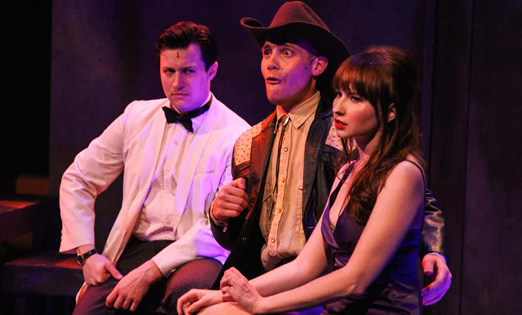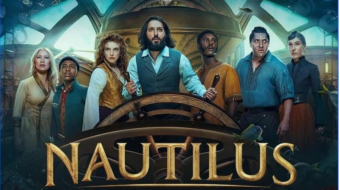
Set during the Cold War, Spies Are Forever made me scratch my noggin and ponder what happens when there’s a playhouse potpourri. While there have been spy spoofs on TV (Get Smart) and in the movies (the 1967 Casino Royale – with Woody Allen, among others, playing James Bond – and the In Like Flint series starring James Coburn, as well as the Matt Helm secret agent comedies featuring Dean Martin) before, this critic has never before seen anything quite like Spies Are Forever.
In this world premiere the conventions of the espionage thriller meet the attributes of the musical, with lots of comedy along the way. What happens when genres collide? Indeed, it seems to me to be neither fish nor fowl but something altogether different that defies neat categorization, a form that alters the definitions of the musical and the spy story.
Book writers Brian Rosenthal, Joey Richter and Corey Lubowich (he also directed the two-acter), aka the Tin Can Brothers and composers/ lyricists Clark Baxtresser and Pierce Siebers, aka TalkFine, have wrought what those other genre benders, Monty Python, had called: “And now, for something completely different.”
This reviewer doesn’t get paid enough to try and explain this play’s pell-mell plot, such as there is. Especially since the motto of the playwrights seems to be: “Consistency causes cancer.” For instance: At the end of Act I, protagonist Curt Mega (played by an actor who also, coincidentally, is named Curt Mega) seems to have been seriously shot. Shortly after the curtain proverbially lifts for the second act, said wound magically heals. Instant presto!
And when Curt is in mid-clench with Tatiana Slozhno, she says no – they have to make out to find out they’re not really attracted to one another. (But of course, Mary Kate Wiles’ wily Russian spy must be named “Tatiana” – her character is probably a homage to Tatiana Romanova, the Soviet agent played by former Miss Rome Daniela Bianchi, who wooed Sean Connery’s 007 in the second Bond film, 1963’s From Russia With Love.)
Suffice it to say that much of the action of this late 1950s/1960s-set covert comedy seems to involve an Eastern European nation somewhere behind the so-called Iron Curtain named the New Democratic Republics of Old Socialist Prussian-Sloviskia. Then, from out of nowhere, it’s move over commies, as neo-Nazis led by the Baron (Brian Rosenthal) try to resurrect the Third Reich. (Actually, since it’s three Reichs and you’re out, I suppose it would be the fourth Reich? In any case, it’s certainly not the Wilhelm Reich.)
There’s a hilarious number straight out of Mel Brooks’ “Springtime for Hitler and Germany” songbook (or playbook?), wherein Baron and his high-larious Aryan chorus sing: “The Nazis are not so bad.” The goosesteppers-cum-Rockettes cut a rug during a droll dance number. However, given the book writers’ Ralph Waldo Emerson-like aversion to consistency, that hobgoblin of little (and, you know, like logical and rational) minds, the theme of the rehabilitation of the Nazi empire soon goes the way of agent Mega’s wound and his aborted seduction of Tatiana. Go take a hike, Reich! Auf wiedersehen, kameraden!
(Warning: Although the ratzi Nazi scene is “Hitler-ious” along the lines of Charlie Chaplin’s 1940 anti-master race masterpiece The Great Dictator and Mel’s The Producers, seeing swastikas, German uniforms and other accoutrements of fascist kitsch whipped up by costume designer Allison Dillard might shock and offend some members of the audience.
WWII have ended 71 years ago this May when the Red Army marched into Berlin, but for some, it may still be “too soon” to see Nazi regalia on the live stage – even if it is in jest and at the National “Socialists'” expense. The Trump campaign’s raising of the specter of fascism could cause some of the laughs to stick in your mouth, as America is confronted with homegrown authoritarianism. And torture – a favorite of stage and screen since the Bush administration revived one of imperial America’s favorite pastimes – is also depicted. Don’t get me started!!!)
Along the way, various espionage conventions are lampooned in Forever, short-circuited by being combined with musical and rom com sensibilities. Zany Tessa Netting’s Barb plays a mélange of the James Bond characters Q and Miss Moneypenny, a quartermaster who provides Mega with cool gadgets, while yearning/burning for the superspy’s attention and affection. Most of the thesps are cast in multiple roles, with the Informant, Susan and others portrayed by an actor credited as Al Fallick (is that really his name or is it meant to be merely symbolic?)
Auds should be aware that amidst the mayhem of this mirthful musical madcap mishmash there is gunplay, swordplay, cigarette smoking (pretty foul-smelling, BTW), and related visual and sound (and nostril) effects. From on high a four-piece band, including TalkFine, rock the house with live music, while there is some wacky dancing choreographed by Lauren Lopez. Forever is more erratic than erotic – this is no Spy Who Loved Me – and Curt Mega is no alpha and omega of spycraft. Some ticket buyers are likely to be stirred, not shaken, by this over-the-top production that pulls out all the stops. And while this about two and half hour rollicking spoof isn’t for everybody, most of the opening night audience seemed to enthusiastically enjoy it, as did your gallivanting critic.
Spies Are Forever is being performed through April 3 on Fridays and Saturdays at 8:00 p.m., Saturdays and Sundays at 3:00 p.m. at the NoHo Arts Center, 11136 Magnolia Blvd., N. Hollywood, CA 91601, on Tuesdays, Thursday, For more info: (800)838-3006; http://spiesareforever.diamonds.
And theatergoers should remember that the 23rd annual Los Angeles Women’s Theatre Festival takes place March 24-27 at the Electric Lodge, 1416 Electric Avenue, Venice, CA 90291. For info and reservations: (818) 760-0408; www.lawtf.org.










